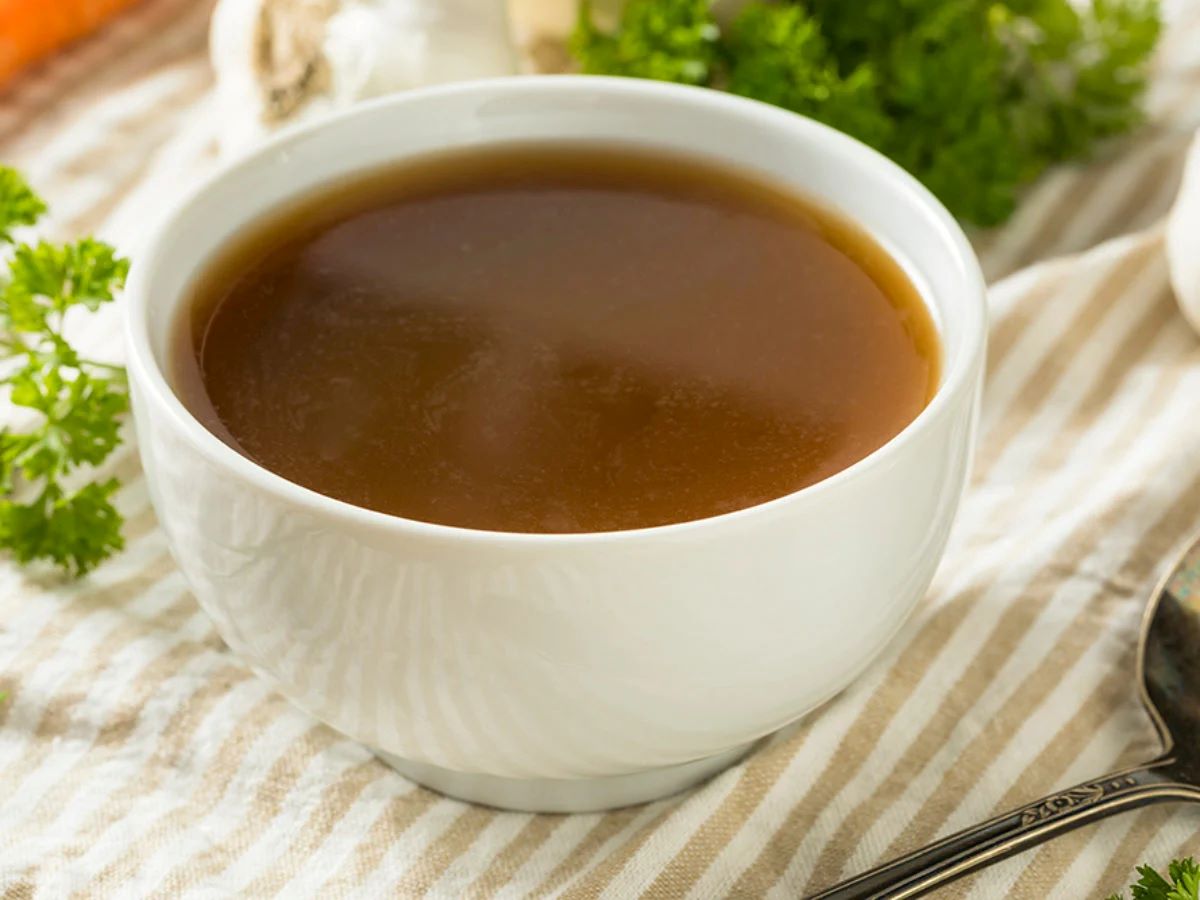
Beef broth is a versatile and flavorful ingredient that can enhance the taste and nutritional value of various dishes. Whether it’s used as a base for soups, stews, or sauces, or simply enjoyed on its own, beef broth is a pantry staple for many home cooks and chefs. But have you ever wondered about the nutrition facts of beef broth? In this article, we will explore 19 key nutrition facts about beef broth, shedding light on its calorie content, macronutrient composition, vitamin and mineral profile, and potential health benefits. So, if you’re curious to know how beef broth can contribute to your overall nutrition, stay tuned to uncover the nutritional secrets of this delicious and nutritious liquid.
Key Takeaways:
- Beef broth is a low-calorie, high-protein liquid that supports muscle growth, bone health, and digestion. It’s like a superhero for your body, helping you stay strong and healthy!
- With essential amino acids, vitamins, and minerals, beef broth is like a magical potion that boosts your immune system, promotes healthy hair, and even helps you sleep better. It’s like a secret weapon for feeling great inside and out!
Rich in Protein:
Beef broth is a good source of protein, with one cup containing around 6 grams. Protein is essential for building and repairing tissues, as well as promoting muscle growth and overall well-being.
Low in Calories:
One cup of beef broth typically contains approximately 17 calories, making it a low-calorie option for those watching their calorie intake.
Essential Amino Acids:
Beef broth contains various essential amino acids that are necessary for proper bodily functions. These include leucine, isoleucine, and valine, which aid in muscle repair and promote optimal brain function.
Hydration:
Consuming beef broth is a great way to stay hydrated, especially during cold winter months or after intense physical activity.
Vitamins and Minerals:
Beef broth is rich in various vitamins and minerals, including iron, zinc, and vitamin BThese nutrients play a crucial role in maintaining good health and boosting overall immunity.
Collagen Boost:
One of the key components of beef broth is collagen, a protein that supports healthy skin, hair, nails, and joints. Regular consumption of beef broth can help promote collagen production in the body.
Supports Digestive Health:
The gelatin found in beef broth can help support a healthy digestive system by soothing the lining of the gut and promoting proper digestion.
Improves Bone Health:
The high levels of calcium, magnesium, and phosphorus in beef broth contribute to the maintenance of strong and healthy bones.
Anti-Inflammatory Properties:
Studies have shown that consuming beef broth can help reduce inflammation in the body, potentially alleviating symptoms of arthritis and other inflammatory conditions.
Boosts Immune System:
The amino acids and minerals found in beef broth help strengthen the immune system, making it more resilient against common illnesses.
Hyaluronic Acid:
Beef broth contains hyaluronic acid, a substance known for its skin benefits. It helps keep the skin hydrated, plump, and supple, reducing the appearance of wrinkles.
Source of Electrolytes:
Electrolytes are essential for maintaining a proper fluid balance in the body. Beef broth contains important electrolytes like sodium, potassium, and magnesium.
Promotes Weight Loss:
Due to its low-calorie content and high protein levels, beef broth can help in weight loss by promoting satiety and reducing calorie intake.
Great Source of Glutamine:
Beef broth is rich in glutamine, an amino acid that supports gut health, aids in muscle recovery, and promotes proper brain function.
Natural Detoxifier:
The nutrients and antioxidants in beef broth help support the body’s natural detoxification processes, assisting in the removal of harmful toxins and waste.
Promotes Healthy Hair:
The collagen and protein present in beef broth contribute to healthy hair growth, strength, and shine.
Aids in Sleep:
The amino acid glycine found in beef broth has been linked to improved sleep quality, helping to promote a restful night’s sleep.
Regulates Blood Pressure:
Beef broth is a good source of potassium, which helps regulate blood pressure levels and maintain a healthy cardiovascular system.
Helps Maintain Healthy Muscles:
The protein content in beef broth aids in muscle growth, repair, and maintenance, making it an excellent addition to an active lifestyle.
There you have it, the 19 beef broth nutrition facts! Incorporating beef broth into your diet can provide you with an array of health benefits, from supporting strong bones to promoting healthy digestion and glowing skin. So go ahead and enjoy the nourishing goodness of beef broth in your favorite recipes!
Conclusion
In conclusion, beef broth is not only a tasty addition to soups and stews, but it also offers several nutritional benefits. With its low calorie and fat content, it can be a great option for those looking to watch their weight. Additionally, beef broth is packed with essential vitamins and minerals, including iron, zinc, and B vitamins. These nutrients play a vital role in supporting overall health and wellbeing. Furthermore, the collagen found in beef broth can promote healthy skin, hair, and nails, while also supporting joint health. So the next time you enjoy a warm bowl of soup, remember the nourishing benefits that beef broth provides.
FAQs
1. Is beef broth the same as beef stock?
No, there is a slight difference between beef broth and beef stock. Beef broth is made by simmering beef meat and bones, while beef stock is made by simmering bones alone. Both can be used in recipes interchangeably, but broth tends to have a richer flavor.
2. Is beef broth high in sodium?
The sodium content in beef broth can vary depending on the brand and preparation method. It is recommended to choose low-sodium or sodium-free options if you are watching your sodium intake. Alternatively, you can make your own beef broth at home to control the amount of sodium added.
3. Can beef broth help with weight loss?
Beef broth can be a helpful addition to a weight loss diet as it is low in calories and contains very little fat. It can be a flavorful substitute for higher calorie and higher fat ingredients in recipes. However, it’s important to note that weight loss is achieved through a combination of a balanced diet and regular exercise.
4. Are there any allergens in beef broth?
Beef broth is made from beef, so individuals with a beef allergy should avoid consuming it. Additionally, some commercially prepared beef broths may contain other allergens such as soy or wheat, so it is important to read the labels carefully if you have specific dietary restrictions or allergies.
5. Can I freeze beef broth?
Absolutely! Beef broth freezes well and can be stored in the freezer for up to three months. It is best to freeze it in individual portions, so you can easily thaw and use as needed. Just make sure to leave enough headspace in the container to allow for expansion during freezing.
Was this page helpful?
Our commitment to delivering trustworthy and engaging content is at the heart of what we do. Each fact on our site is contributed by real users like you, bringing a wealth of diverse insights and information. To ensure the highest standards of accuracy and reliability, our dedicated editors meticulously review each submission. This process guarantees that the facts we share are not only fascinating but also credible. Trust in our commitment to quality and authenticity as you explore and learn with us.


